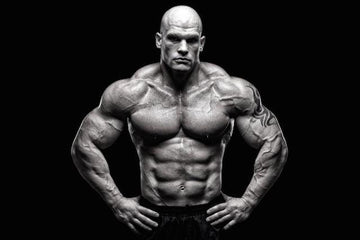

Gaining Strength While Getting Ripped: Is it Possible?
Table of Contents
Gaining Strength While Getting Ripped: Is it Possible?
by: Robbie Durand
Many athletes involved in weight reduction sports will mention that as they begin to diet, they will also lose muscle strength. There is not sufficient evidence to prove that weight loss causes reductions in strength as some athletes that I have spoken to suggest that they are able to maintain their strength despite weight loss. According to new research, the type of diet you are following plays a big role in how much strength you lose while dieting. Researchers studied the effects of a 4-week weight reduction period with high protein and reduced carbohydrate intake on body composition, explosive power, speed, serum hormones, and acid-base balance in male track and field jumpers and sprinters.
Eight participants were assigned to a high weight reduction group energy restriction 750 kcal per day) and 7 to a low weight reduction group (energy restriction 300 kcal per day). The plan was to maintain this restriction for four weeks while keeping protein levels high. In both groups, daily protein intake averaged around 2.1 grams per kilogram of bodyweight. The researchers tested the power of the participants before and after the four-week period. They also measured body composition, hormonal changes, and acid/base balance. The relative reductions in protein, carbohydrate and fat intake were 0%, 15% and 14% for the LWR and 0%, 22% and 35% for the HWR group.

At the end of four weeks, energy and carbohydrate intake decreased significantly only in high weight reduction group. Furthermore, total body mass and fat mass decreased only in high weight reduction group. Fat-free mass (FFM), serum testosterone, cortisol, and sex hormone–binding globulin did not change significantly. Ca2+ ion and pH decreased only in high weight reduction group. The countermovement jump and 20-m sprint time improved consistently only in high weight reduction group. Finally, athletes with a fat percentage of 10% or more at the baseline were able to preserve fat free mans. In conclusion, altered acid-base balance but improved weight-bearing power performance was observed without negative consequences on serum hormones and FFM after a 4-week weight reduction of 0.5 kg·wk−1 achieved by reduced carbohydrate but maintained high protein intake. Fat mass decreased significantly only in the high deficit group, to the tune of around 3.7 pounds on average, as compared to less than half a pound in the low deficit group. Lean mass did not change significantly in either group, nor did the athletes’ levels of cortisol or testosterone. The high deficit group even saw some level of improved performance in their sports. This suggests that for lean individuals, a slightly higher caloric deficit may be better for fat loss than a lower caloric deficit. Just don’t cut those calories out of your protein intake. Keep that nice and high, to the tune of a gram per pound of body weight.
Huovinen HT, Hulmi JJ, Isolehto J, Kyröläinen H, Puurtinen R, Karila T, Mackala K, Mero AA. Body composition and power performance improved after weight reduction in male athletes without hampering hormonal balance. J Strength Cond Res. 2015 Jan;29(1):29-36.
MUSCLE MEDIA MAGAZINE FOR MEN
The premier source of training, nutrition, supplements, fat loss and health for men.

















